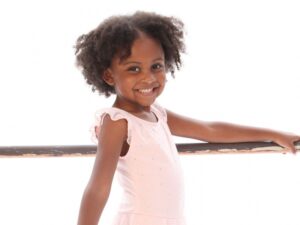
Capturing your Child’s Creativity
As parents, we witness many indescribable moments because of our children. It doesn’t get much better than watching your own beautiful ballerina pirouette across the stage for the first time, or the way your heart swells when you witness a near perfect musical performance by your child who can’t even reach the bathroom sink.
Children need to be challenged and presented with opportunities to fine tune their creative attributes. They have innate abilities and respond to music; they are innovative and expressive. The performing arts are a natural fit for them, and providing artistic experiences early on will not only benefit them now, but will also provide enjoyment for a lifetime.
Performing arts benefit the whole child, not just one area. For instance, researchers link the study of performing arts to higher academic achievement. Music education also trains children for higher order thinking and utilizes the right and left side of the brain simultaneously. Additionally, research continually proves that music enhances brain development and dance, of course, promotes strength, poise and endurance.
According to Americans for the Arts, students with an education rich in the arts have higher GPAs, higher standardized test scores, lower drop-out rates and even better attitudes about community service than those without. Not to mention, the added benefits of self-confidence, discipline, goal-setting, perception of the world around them and artistic and emotional expression.
An appreciation for the arts begins in the home with you, the parent, setting the example and nudging them along. You may have two left feet and can’t carry a tune in a bucket, but there are things you can do to help your child discover a love for the performing arts.
Tune In
From the very beginning, babies respond to your voice, so use it. Sing to them, talk to them. Be expressive, use different voices and inflections. As soon as they’re big enough, bounce them on your knee and sway to the music—all kinds of music. Many local businesses and performing arts centers offer some type of mommy and baby classes as well.
Kris Cangelosi of Cangelosi Dance Project adds, “By playing music in the home, your child will react by moving, singing, pounding on the chair or organizing their siblings. This behavior lends distinguished indication of dance, voice, drums or direction. Dance is physical movement that expresses many feelings of joy or interpretation of a theme.” Everyone has some response to music and can benefit from it.
Tiny Dancer
Get your children signed up for classes as soon as they are eligible. Most of the time, you can start your children in dance once they are potty trained. Many local dance studios will have lessons for those as young as two years old. You may realize that your child is not ready to separate from you for an hour to dance, but until then, stick to the classes where you can accompany her. Read those cues and don’t force a child into an activity, which may keep him or her from trying the activity again when they’ve matured.
Piano lessons are best once your child can count to five and his hands are large enough to play the keys without a struggle. Because of the required dexterity, children may not be able to play until they’re a little older.
Ear to the Ground
It’s not a good idea to force your children into an activity, but you don’t want to be absent either. After parents give their children the tools they need to figure out their interests, parents can step aside and assume the role of cheerleader. For younger children (under age 10), parents can sometimes sit in on the lessons so that they can easily help their children at home. Ask for take-home materials, so you can stay involved.
Take it to the Streets
By all means, get out of the house. Step outside of regular lessons and audition for a play or find a community arts project to devote your time to. Support live music and go to as many concerts, performances, musicals and plays as you can. Give your little ones the opportunity to see what’s possible with dedication. Sure, it’s glamorous to be onstage, but it takes hard work to get there.
By experiencing new things, aspiring performers can learn about goal setting and the discipline and structure required in reaching their goals. You never know what’s inspirational to a child—what can plant a seed that will lead to their passion. Maybe you don’t want to go see Annie again, but what about that future Broadway star on your hands?
Don’t Think Twice
Even if you don’t have a background in music, refrain from trying to contain your child’s enthusiasm because of your unfamiliarity. So what if she wants to play the spoons or didgeridoo instead of the violin? What’s that—you don’t know what a bassoon is? It’s time to learn! Everybody has their own way of connecting to music and exploring that is invaluable for children. Trying a variety of instruments is always best.
“Imagination and creation bring enthusiasm to one’s personality,” says Cangelosi. She describes those young ones involved in the performing arts as “the new inventors of the future.” Help your child find the right outlet.
In the end, even if your child does not pursue music or dance as a career in the future, there is still so much to gain from his or her experiences while pursuing the arts during his or her time during the school years, even after the tutus are stowed away and the trophies are forgotten. What remains is art’s lasting impression, which can be awakened by your little one at any time. Who knows? Your child might just discover his very first love.





